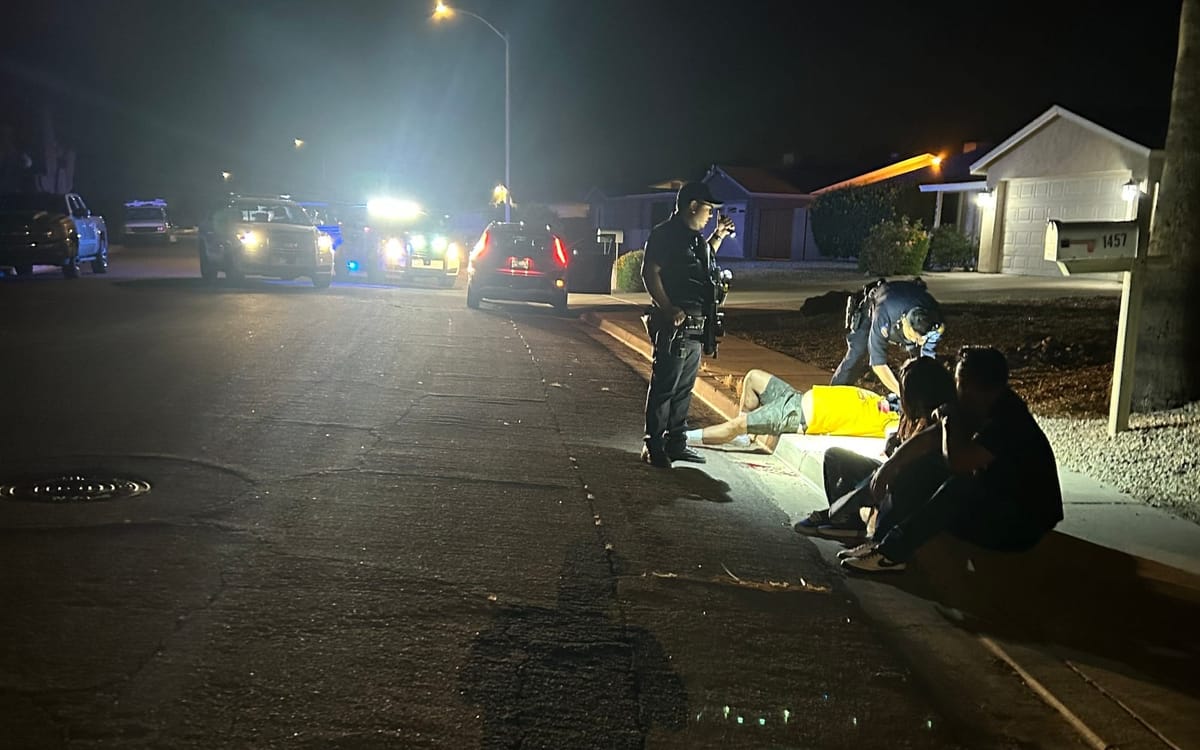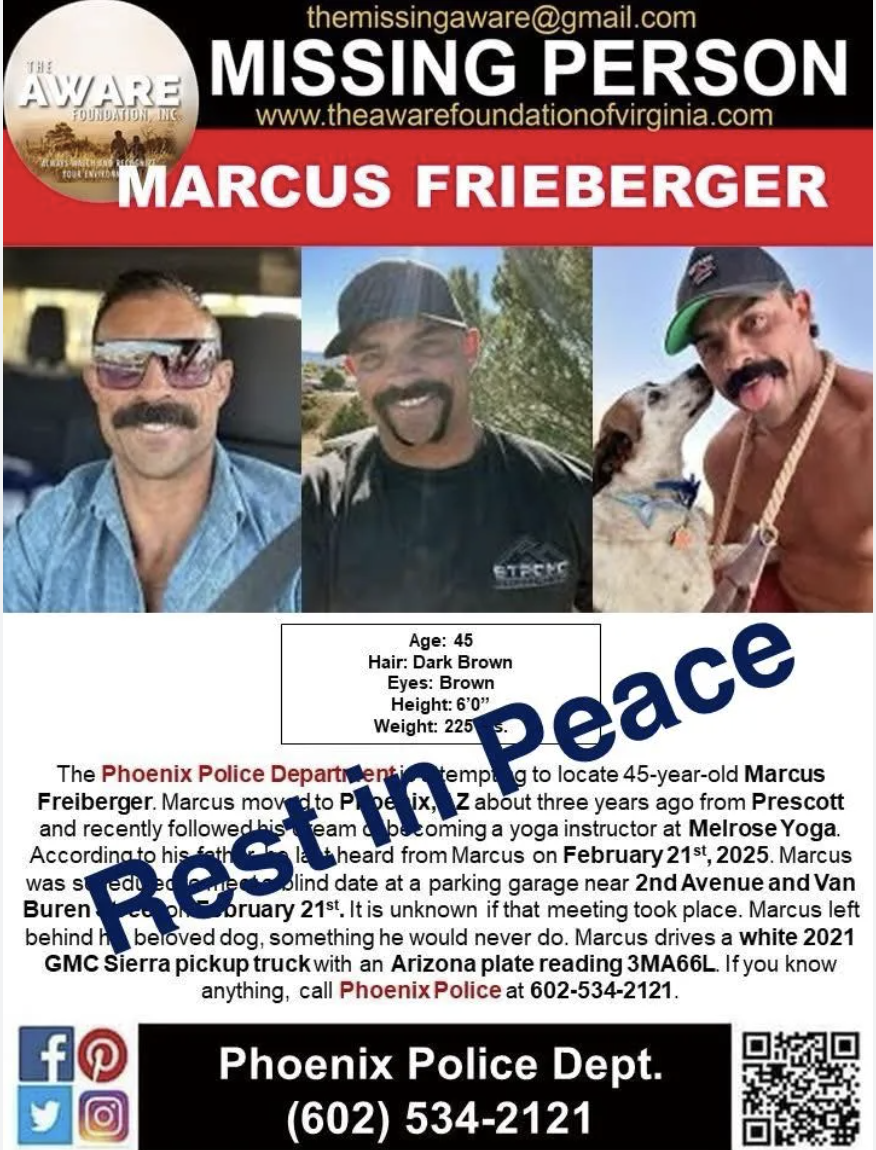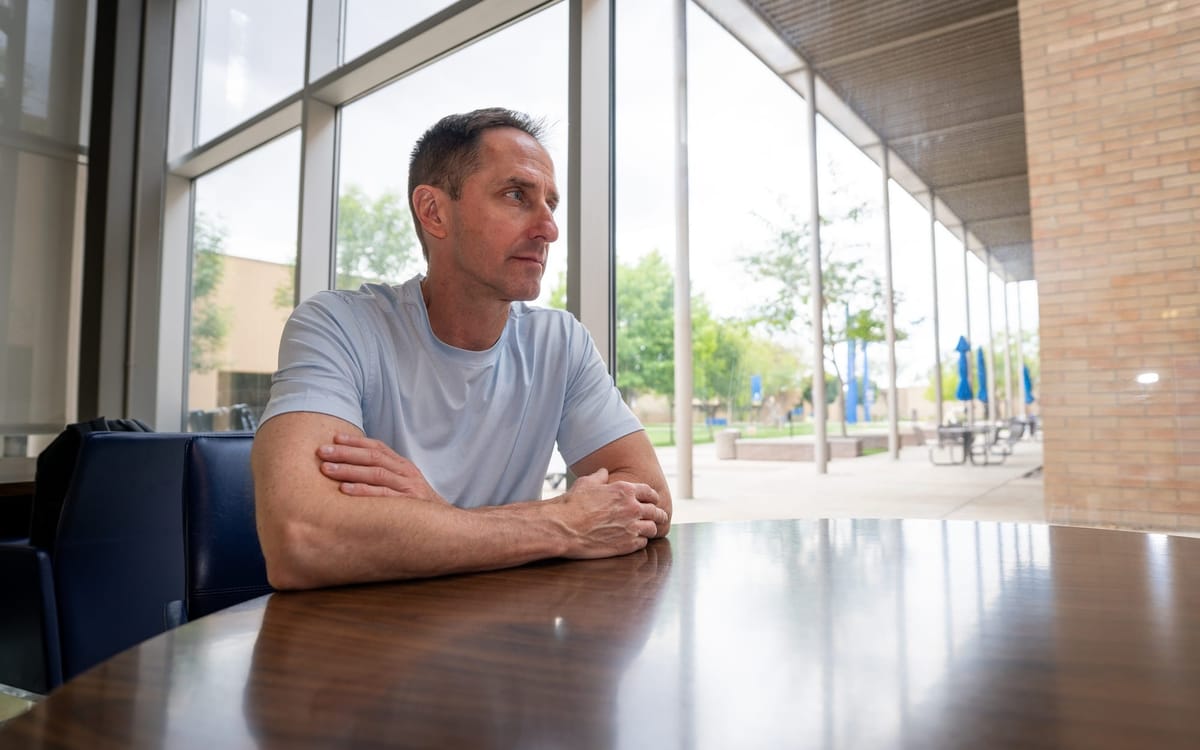"A Clear Attack On The Queer Community Under Pretext"
Republicans in a House Committee said a drag ban was to protect children. Democrats called them on their bluff.
Rumors swirled after a Phoenix yoga teacher went missing and was later found dead. But his loved ones say they’re still in the dark — and the police stopped looking.

For just under a month, Marcus Freiberger’s name was all over the internet in Arizona. Among people in LGBTQ+ chat groups, missing persons threads and social media posts, Freiberger was regarded as a tale of caution, woe and even conspiracy.
People claimed his disappearance was related to the rising cases of hate crimes across the nation. Rumors spread that a group of local kids were catfishing on dating apps to harm gay men. Some speculated drugs were a major factor.
Five days after a missing persons report was filed, police found him dead — naked and floating in a rock quarry in south Phoenix.

But the rumors didn’t stop. National news outlets portrayed the case as mysterious — possibly a violent crime that echoed patterns seen in anti-LGBTQ+ attacks from upstate New York to Seattle.
It took months for Freiberger’s family or friends to learn any details about what happened — and even then, most of the information came through news reports, not police officials.
To this day, questions remain. The medical examiner’s autopsy report released in May offered a less-than-conclusive cause of death. Before the report was made public, police had closed the case without explanation or a narrative about what happened the night Freiberger left his apartment for an alleged date and never returned.
As a result, those close to Freiberger say Phoenix police left them feeling dismissed, ignored and kept out of the loop.
They just want to know what happened.
On Friday, Feb. 21, news outlets reported that Freiberger, 45, had left his home to go on a blind date. It would be the last time his friends and family would hear from him.
Christopher Krcmarik, Freiberger’s ex-partner, said it wasn’t unusual for him to disappear for days on end, but became concerned when text messages went unanswered.
A mutual friend suggested Freiberger may have gone away to “make some money real quick.” Krcmarik said Freiberger was “always having phone issues” — it wouldn’t have been unusual for him to lose his phone.
On March 3, Krcmarik said he stopped by Freiberger’s house. There, he found Thomas — the dog they had adopted together — left unattended and unfed.
Krcmarik contacted Freiberger’s sister, who contacted their parents. Collectively, they decided to wait two weeks before reporting him missing.
Amber Cranford, a longtime friend of Freiberger who initiated the circulation of missing persons flyers that gained national attention, said she was taken aback by the police response.
“They did not seem to take his disappearance seriously,” she told LOOKOUT in an email.

Cranford said she pleaded — without success — for police to track Freiberger’s cellphone or request his last known location from his carrier. Police told her they couldn’t because there was no evidence of a crime to obtain a subpoena.
“‘Sometimes people do this,’” she said the police told her, referencing rare cases where people voluntarily go missing.
Cranford said she believed media attention would persuade police to do more than post a flyer online.
“Even with all of the exposure we tried to get this story, the Phoenix PD never once reached out to the public for help,” she said. “It was extremely frustrating.”
(It remains unclear what community outreach steps, if any, detectives took.)
Five days after the missing persons report was filed, law enforcement discovered Freiberger's unclothed body floating in a rock quarry at a construction site near 15th Avenue and Broadway Road in Phoenix. His truck was parked nearby.
Nearly four months later, the Maricopa County Medical Examiner released the autopsy and toxicology report, which showed Freiberger had methamphetamine in his system and suffered blunt force trauma to the head, right ankle and ribs. The cause of death was ruled “undetermined.”
Before the public release of the report, police had already closed the case, according to an email to LOOKOUT from the Phoenix Police Department.

Friends and family learned of the medical examiner’s report through media coverage. Krcmarik, who had been listed as the primary contact, said detectives never notified him.
“I generally felt like law enforcement seemed very cavalier about the situation,” Krcmarik said. “They didn’t seem to take it very seriously, and there wasn’t much sense of urgency. Marcus’ father actually told me the first detective assigned to the case implied Marcus was ‘just another gay man’ and pointed to his past drug use.”
LOOKOUT attempted to contact Freiberger’s father, Dutch, to confirm Krcmarik’s statement, but no one responded back for comment.
“Somebody knows something out there, and they’re not telling," Dutch Freiberger said in an interview with the Arizona Republic in July, adding that he was skeptical on the way his son showed up naked in the quarry — a mile away from his car and without his phone, which was never found.
When asked, Phoenix police said in a statement to LOOKOUT: “If there is concern of misconduct or unprofessionalism, the family member can ask for that particular investigator’s supervisor or they can reach out to our Professional Standards Bureau to investigate the allegation.”
LOOKOUT identified Detective Butch Titus as initially assigned to the case, though Phoenix police declined to confirm his full name. Once Freiberger’s body was found and the case transitioned into a death investigation, Detective Taylor Locke took over.
Krcmarik said Locke was “generally caring” and “much more earnest” than Titus, but that he still had to initiate most of the contact.
LOOKOUT has previously reported on similar negative experiences LGBTQ+ victims have had with Phoenix police detectives — specifically in the cases of Rene Almaraz and Ron Blake, where LGBTQ liaisons assisted law enforcement.
But unlike those cases, neither Titus nor Locke were LGBTQ liaisons, and police confirmed no such liaisons assisted with Freiberger’s case.
Since LOOKOUT’s reporting on Almaraz and Blake, Phoenix police confirmed they no longer employ community LGBTQ liaison officers, despite having done so for years.
Cranford said she’s not giving up.
“Marcus did not deserve this,” she said. “He was loved, and he mattered. His family, his friends and everyone who cared about him deserve the truth and some kind of closure. We will not stop fighting for justice.”
In the absence of a clear investigation, online crime sleuths filled the gaps.
Freiberger had previously worked for Northline Roofing in Prescott and started his own company — Strong Roofing — in 2021. According to the Arizona Registrar of Contractors, his license was revoked in September 2024, though the reasons have not been made public.
KTVK/KPHO (AZ Family) reported in December 2024 that the outlet had received complaints from customers who said they were “ripped off” by Strong Roofing.
Some commenters on Reddit threads and Facebook posts amplified the rumors, including one woman who claimed on Facebook that she was scammed out of $7,000 by Strong Roofing.
Then there was Freiberger’s history of drug use, specifically methamphetamine.
According to Dr. Jennifer Corneal, the medical examiner who signed the report, the cause and manner of death were undetermined because “it is unclear if Mr. Freiberger’s death is a result of an accidental or intentional (self-inflicted or at the hands of another) act.”
“The decedent’s death may be attributable to drowning in the setting of acute methamphetamine intoxication,” she wrote. “However, several factors warrant further consideration.”
“That [ruling], in my opinion, is unacceptable,” said Brian Moultrop, a longtime friend, when asked about the finding in June. “I don’t know if [the police] are just not investing the time, or are just out of leads … but in my view, this wouldn’t have just ‘happened.’”
Moultrop acknowledged Freiberger had struggled with addiction — something he said Freiberger would have been open about. The two had been close friends and temporary roommates, and Moultrop supported him during his recovery, including a brief relapse.
A more persistent theory in online forums and group chats was that Freiberger was the victim of catfishing on gay dating apps. In a private Facebook chat for gay men, users claimed that teens were posing as attractive men on Grindr to lure victims for robberies and beatings. Some speculated Freiberger was targeted in a prank that went too far.
There’s no confirmed evidence of his app usage, but the theory has amplified concerns about dating app safety in the LGBTQ+ community.

“I absolutely don’t feel like enough safety measures are in place on these apps, and I don’t think cases are taken seriously when meetups go awry,” Krcmarik said. “Anybody can lie — that goes with the territory. It’s sad, because people just want to meet people for connection.”
In the months leading up to his death, Freiberger had committed himself to his passion: helping others find healing through yoga.
In December 2024, he completed his Yoga Teacher Training at Southwest Institute of Healing Arts and had already begun teaching at Melrose Yoga. He was also set to begin teaching at Black Swan Yoga, though he never had the opportunity to do so before his death.
“A year ago I set out to start my journey as a Yoga Therapist!!,” Freiberger wrote in a December 2024 Instagram post. “My life had been flip turned upside down over the last year and a half. Without this journey, I have no idea if I would be around anymore. I don’t say that lightly, I say that with all seriousness. This journey is forcing me to go inward to find my answers, my peace, and to heal. I am so grateful for my life and the peace this journey brings, allowing me to be calm in my storm.”
Krcmarik said yoga had been Freiberger’s true passion all along – not roofing.
“He was always fighting for this ego of being a perfect son and business owner. It took a lot out of him,” he said. “He always wanted to be a yoga therapist and help people work through trauma and their blockages.”
And online, Freiberger is still remembered for his compassion, openness and magnetic energy.
“He was one of the first people I met when I moved to Arizona,” wrote his friend Ken Hudmon on Facebook. “We became close friends, and shared many hours together…He was there anytime I needed a friend to truly open up to.”
With the case closed, and feeling like answers will never come, friends of Freiberger have resigned themselves to creating their own sense of closure through supporting the LGBTQ+ community as Freiberger would have wanted.
“At this point, we’re left to the closure we give ourselves,” Krcmarik said.
At LOOKOUT, we believe in the power of community-supported journalism. You're at the heart of that community, and your support helps us deliver the news and information the LGBTQ+ community needs to thrive.
LOOKOUT Publications (EIN: 92-3129757) is a federally recognized nonprofit news outlet.
All mailed inquiries can be sent to 221 E. Indianola Ave, Phoenix, AZ 85012.